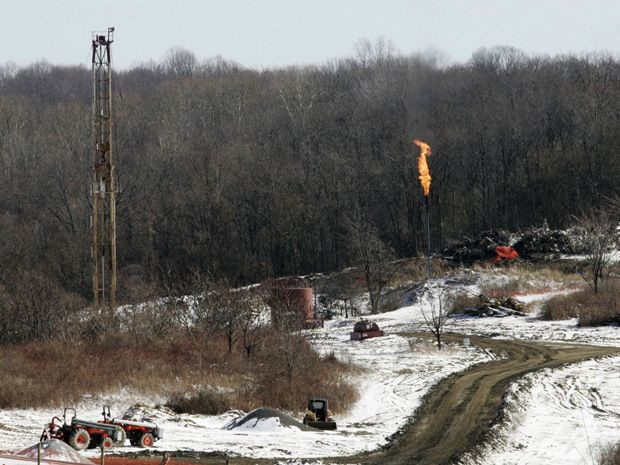US Shale Gas Boom Attracting Investments From Chinese Energy Companies

A large private Chinese clean energy company says it plans to build natural gas refueling stations along U.S. highways for truckers. If it succeeds, it will join an increasingly crowded playing field among competitors seeking to capitalize on the U.S.' shale gas boom and the country's efforts to scale back its dependence on crude oil imports.
Langfang-based ENN Group Co. Ltd, a builder of clean fuel energy installations at home and abroad, including IT systems and liquefied natural gas (LNG) delivery networks, said for that for starters it would construct 50 natural gas stations in the country this year, according to Reuters. The stations will serve the trucking industry, which is embracing the fuel because it costs less than diesel.
The initial investment comes after two years of efforts by the company to find a U.S. partner. It was reportedly rebuffed by Clean Energy Fuels Corp. (Nasdaq:CLNE), which is owned by business magnate T. Boone Pickens, and it later struck up a deal with a small player in natural gas delivery, Utah-based CH4 Energy Corp.
While the initial investment is small -- it's estimated at only $50 million -- ENN is a major player in natural gas systems. It has built more than 200 LNG refueling stations in China, and in February the company signed a deal with Canadian natural gas engine manufacturer Westport Innovations Inc. (Nasdaq:WPRT) to expand its global operations in promoting clean fuel engines.
The deal reflects rising interest by Chinese companies in U.S. investments, which hit a record high last year and are on their way to setting another record in 2013.
In February, Beijing-based Sinopec Group announced the acquisition of half of Oklahoma City-based Chesapeake Energy Corp.’s (NYSE:CHK) oil and gas assets in the Mississippi Lime deposit in a $1 billion deal. Sinopec owns China Petroleum & Chemical Corp. (HKG:0386), China’s second largest energy concern and one of the world’s largest publicly listed companies.
China’s overall U.S. foreign direct investment (FDI) has risen from less than $1 billion in 2008 to $6.5 billion last year when Chinese FDI in the U.S. increased by 17 percent. Already this year a major Chinese energy company has invested in a $1 billion deal in natural gas investment in northern Oklahoma.
“There are billions and billions of dollars to come,” Thilo Hanemann, a China analyst for New York-based research firm Rhodium Group, told the Washington Post earlier this year after publishing a report saying that Chinese FDI in the U.S. this year will break 2012’s record. China’s Ministry of Commerce said in December that the country’s total accumulated FDI in the U.S. stood at $10.1 billion, claiming the Rhodium report was overstating the amount of equity held in the U.S. by Chinese companies.
China has a reason to downplay the activities of its companies in the U.S.
At least some of these investments have raised political concerns. Late last year Congress urged the U.S. government to block acquisitions or mergers by Huawei and ZTE Corporation (HKG:0763), China’s two largest phone-equipment makers, out of concern it would provide opportunities for Chinese intelligence services to tamper with U.S. telecommunications networks for spying.
To quell potential alarm over the proposed purchase of beleaguered lithium-ion battery maker A123 Systems, Inc. (PINK:AONEQ) by Wanxiang America Corp., the North American arm of China’s largest auto parts maker, the Chinese company had to agree to exclude A123’s defense contracts from the deal.
"The U.S. attitude toward China is a combination of Cold War mindset and trade protectionism," Bai Ming, a senior fellow with a Ministry of Commerce research institute, wrote in a recent editorial about U.S.' aversion to Chinese investment from Xinhuanet.
© Copyright IBTimes 2024. All rights reserved.






















